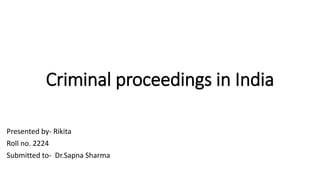
criminal proceedings in india
- 1. Criminal proceedings in India Presented by- Rikita Roll no. 2224 Submitted to- Dr.Sapna Sharma
- 2. All about the various stages of criminal trial in india
- 3. Crime –Any act or omission which is prohibited by law and is punishable by law is a crime. • The procedure for such crime is decided by following procedure of criminal trial. • The criminal trial in india is well established statutory, administration and judicial framework. • The whole criminal law consist of three Main act; 1. Indian penal code,1860(IPC) 2. Code of criminal procedure,1973(Cr.P.C) 3. Indian evidence act,1872(IEA)
- 4. •Cr.P.C-is the procedural law for conducting a criminal trial in india.the procedure include the manner for collection of evidence, examination of witness, interrogation of accused,arrest , safeguard and procedures to be adopted by the police and court. • IPC-is the primary penal law of India which applies to all offence. • IEA-is a comprehensive treaty on the law of evidence which can be used in the trial.
- 5. Types of offences • Bailable offence- offence in which bail can be granted by the law. • Non bailable offence offences in which bail cannot be granted. • Cognizable offence offences in which a police officer can arrest a person without warrant. • Non cognizable offence in which the police officer cannot arrest without a warrant from the magistrate. • WARRANT CASE where the offence is punishable with death,life imprisonment or imprisonment for more than two years. • SUMMON CASE where the offence is punishable with imprisonment of less than two years .
- 6. Hierarchy of Indian judiciary system
- 7. 1.Commission of offence 2.a)information to police.b) complaint to magistrate • Police identify wether the offence is cognizable or incognizable • For the cognizable Offence FIR Must be registered and for the noncognizable NCR (Non Cognizable Report ) • Now the police investigate the case . Investigation include; 1.Collection of evidence 2.Statement of witness 3.Interrogate the accused • Investigation is completed by the police • If offence is not committed by the accused then case closure is filed ,if offense Is committed by accused then police will arrest the accused.
- 8. • After, arrest production of accused to magistrate with in 24 hour. • The accused kept in police custody or in judicial custody. • Charge sheet (A final report prepared by the investigation or law enforcement agency for proving the accusation of a crime in a criminal court of law). • Chargesheet is filled before the presenting the accuse to magistrate.
- 9. Trials • Trials ; process in a court of law where a judge listen to evidence and decide if somebody is guilty of a crime or not. • Session court ➡️ framing of charge➡️if the accused plea not guilty ➡️prosecution evidence ➡️ statement of the accused ➡️ examine in chief,cross examination,re- examination ➡️final argument ➡️ judgement and sentence by the court. AQUITTAL OR CONVICTION .
- 10. Thank you